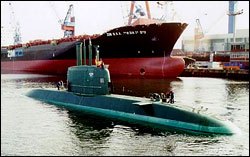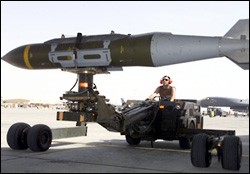Multi-Year Plan to Strengthen IDF Conventional Capabilities
by JINSA Research Associate Allison Krant.
by JINSA Research Associate Allison Krant.
The Israel Defense Forces (IDF) has reprioritized its acquisition schedule for years to come as a consequence of lessons learned from the summer 2006 battles with Hezbollah. Prior to the conflict, Israel’s defense spending had been focused on communications, systems integration, and network-centric battle systems at the expense of ground combat training and readiness. The new plan will have the IDF concentrate on bolstering manpower over technology in an effort to protect Israel from the wide range of security threats beyond the war against Palestinian terrorists.

On September 3, IDF Chief of Staff Lt. Gen. Gabi Ashkenazi announced the new five-year multi-dimensional military procurement plan, “Tefen 2012.” Under the new $60 billion plan, previous efforts to draw down the size of the Israeli military will effectively be reversed, with the first priority given to building the Ground Forces Command and concomitant increases in equipment purchases and troop readiness and training. “Our people are the source of IDF might,” Deputy Chief of Staff Maj. Gen. Moshe Kaplinsky told reporters during an early September briefing on the new budget, according to Defense News, September 10.
Tefen 2012 is awaiting approval by Israel’s political leadership, and implementation is scheduled to begin early next year.
The Tefen plan includes provisions to upgrade military ground vehicles and tanks with Israeli-developed active protection systems. Accordingly, the IDF will procure large numbers of locally produced Merkava Mark IV main battle tanks each year. Production of this latest generation of Israeli-produced tank had been in limbo for some time due to funding shortfalls.
In addition, the IDF will acquire hundreds of new Namer heavy-tracked armored personnel carriers, based on the Merkava chassis. Anti-rocket vehicle defense systems, most likely Rafael Advanced Defense Systems Ltd.’s Trophy active defense system, will be installed on the newest tanks as well as an indeterminate number of older Mark III and Mark II Merkavas, according to Defense Industry Daily, September 5.
The tremendous acquisition schedule is recognition by the IDF that Israel must be prepared for a broader range of threats in the future than it planned for over the past decade. New threats include “global terrorism, the northern border, the Iranians or the new arms supplies of Syria,” a senior IDF officer told Ha’aretz on September 9. Priority is no longer given to “the confrontation with the Palestinians,” he said.
“This plan took into consideration all of the current threats Israel faces into consideration,” a high-ranking IDF officer told The Jerusalem Post on September 3. “This plan will hopefully prepare the IDF for dealing with those future challenges.”
Kaplinsky summarized IDF priorities under the new plan as a “significant strengthening of ground forces, strengthening the long arm of the…Air and Space Forces branch, and improving our relative qualitative edge at sea and out control of coastal waters.”

Under the pre-war procurement plan, the IDF/Air Force expected to receive 100 fifth-generation stealthy Lockheed Martin F-35 Lightning II strike fighters to replace a number of ageing U.S.-built F-16 Fighting Falcons. Now, it seems, they might not even purchase half of that amount. “They’re now talking about one squadron of 25 planes…and if we’re lucky we may get another squadron of 25 in the next five-year plan,” an airpower lobbyist told Defense News, September 10.
Reportedly, the IDF/Air Force will continue with a planned investment in a new fleet of transport aircraft. Under consideration are an unknown number of the latest J-model of Lockheed Martin’s venerable C-130 Hercules transport plane. Also, plans to upgrade the service’s unmanned aerial vehicle (UAV) fleet will remain in force.
The IDF/Navy is still hoping to acquire two new multi-purpose ships, equipped with missile defense and land attack capabilities. The Littoral Combat Ship (LCS) developed by Lockheed Martin and three other U.S. firms had been under consideration but the scandal-plagued ship may be fatally delayed in reaching Israel. It was expected that any Israeli-purchased LCS would be equipped with Rafael’s Barak ship-borne anti-missile defense system.

The IDF/Navy expects to acquire two additional German-built Dolphin-class submarines, possibly equipped with air independent propulsion systems. Israel acquired three diesel electric models from Germany delivered in 1998 and 1999. The submarines, custom-equipped to Israeli specifications and manufactured by the Kiel-based Howaldtswerke-Deutsche Werft AG (HDW), are considered to be the most advanced non-nuclear submarines in the world.
In addition, the IDF/Navy is set to procure the first of seven fast patrol vessels originally contracted in January 2006 under a combined U.S. FMS and locally funded Ministry of Defense program, Defense News reported, November 5. Four Israel Aerospace Industries Super Dvora Mk-IIIs and three Israel Shipyards Shaldag boats will be acquired featuring a German-Swedish jet propulsion system offering the ability to operate in shallow waters close to shore. The boats will be used primarily to boost the IDF/Navy’s coastal capabilities. Over half of the funding for the building of these ships will come from U.S. military aid. All seven ships are expected to arrive in IDF/Navy bases by January 2008.
IDF to Expand C4I Capabilities
The IDF is expected to increase spending on command, control, communications, computer, and information (C4I) technologies. In addition to increased funding, the IDF General Staff’s C4I Directorate will also receive an expansion in its mission responsibility and will receive additional technical and support staff.
This organizational restructuring was another hard-learned lesson from the Lebanon War. An IDF general officer told Defense News in a mid-September interview that the war caught the IDF “at an uncomfortable intersection” with regard to C4I capabilities, which forced many soldiers to improvise while on the move.
Communications security, a weakness thought to have been exploited by Hezbollah (with assistance from either Syria or Iran) will be addressed by a single secure network. The IDF plans to extend its fiber-optic high-speed broadband network, known as “Gold Avnet,” to mobile ground, air and naval ranks by 2012. The plan is to use wide-area wireless point-to-point and point-to-multipoint (WiMAX) technology “to fuse information into a network that allows the soldier to share information with a tank or an aircraft,” Maj. Gen. Ami Shafran, head of the General Staff’s C4I, told Defense News on October 1. The IDF, defense sources say, should be the first military in the world to use WiMAX wireless technology by 2008.
IDF/Air Force to Acquire Replacement Arms in U.S. Deal
Regardless of budget cuts, the IDF/Air Force is expected to sign a huge arms deal with the Pentagon independent of the Tefen plan, according to Defense News, October 1. IAF munitions had reportedly reached dangerously low levels even before the 2006 battles with Hezbollah. In response to Israeli requests, the U.S. Department of Defense has put together a series of four Foreign Military Sales (FMS) arms packages, estimated at $1.2 billion to replace missiles, munitions, bomb kits, support gear expended over recent years, including hundreds of millions of gallons of fuel. Included in the package are Paveway laser-guided bombs, BLU-109 hardened penetration bombs, Joint Direct Attack Munitions (JDAM) kits and GBU-28 bunker busting bombs.
The FMS arms packages are a response to Israeli requests to the Pentagon’s Defense Security Cooperation Agency (DSCA) in August to refill bomb stocks that were near depletion in the aftermath of last year’s war, Defense Industry Daily reported, August 7. Various American-made bombs and precision guidance kits, including JDAM tail kits, Paveway II laser-guided kits, GBU-28 Enhanced Paveway III bunker buster laser/GPS guided live bombs, as well as various other live bombs and live fuse components, were part of the requests and are a part of the FMS sales packages, according to Defense Industry Daily, August 7.

Congress approved the packages in late September, but many in the Israeli defense industry are skeptical about spending such large amounts of money on American-made armaments rather than investing in locally developed weaponry, senior executives told Defense News, October 1. Of particular concern is the Defense Ministry’s plan to acquire large numbers of Raytheon AIM-9M Sidewinder air-to-air missiles and the Hughes/Raytheon Advanced Medium-Range Air-to-Air Missiles (AMRAAMs) when the Israeli Python 5, Derby and other locally-developed air-to-air missile systems have come to characterize the best of the Israeli defense industry on the world market.
Some Israeli defense executives fret that Israel has become overly dependent on U.S. military aid. Although a certain portion of the aid that the United States provides to Israel every year is allocated to the development of locally made armaments, the criticism is that the Israeli government is not providing enough funds and relying too much on the acquisition of American-made equipment. “It’s all a matter of priorities. So if funding a next-generation fire control radar or another high-priority project means we need to buy off-the-shelf U.S. missiles to fill our warehouses, that’s the way it has to be,” an Israeli defense official told Defense News.
Indeed, DSCA announced in late August that Israel had requested 20 Boeing RGM-84LBlock II Harpoon anti-ship missiles and 500 Raytheon AIM-9M Sidewinder Short Range Air-to-Air Infrared Guided Missiles, according to Defense Industry Daily, August 24. In addition, Israel requested 90 million gallons of JP-8 aviation jet fuel and 42 million gallons of diesel fuel.
More recently, on October 29, Israel requested another Foreign Military Sale from Congress worth $1.329 billion in missiles and munitions. The DSCA released a report on November 1 detailing additional missile requests, which included 2,000 Radio Frequency TOW 2A Missiles; 1,000 AGM-114K3 Hellfire II Missiles; 200 AGM-114L3 Hellfire II Longbow Missiles; 500 AGM-114M3 Hellfire E II Missiles; and 100 Patriot ballistic missile interceptors of the Guidance Enhanced Missile-Plus model. Cartridges, projectiles, fuses, charges, containers, spare and repair parts, test and tool sets, personnel training and equipment, and other logistical support components were also part of the request, DSCA announced.
IDF Modifies Missile Defense System
As a result of the nearly 4,000 missile and rocket attacks launched on Israel’s northern frontier during last summer’s war, the IDF has redeployed an Arrow ballistic missile defense system in the north. The Arrow first became fully operational in 2000, and was deployed in the Palmahim Air Force Base, near the Israeli coastal town of Ashdod, and at an undisclosed site in northern Israel. “Our assumption is that the next war will be characterized by missile onslaughts, and lots of them,” a top IDF officer told The Jerusalem Post, September 6. A more-advanced model of the Arrow is reportedly under development will serve to intercept missiles at a higher altitude. The Defense Ministry recently submitted a request to the Pentagon to receive information on two American-made missile defense systems, the Terminal High Altitude Air Defense (THAAD) and the Aegis ship-borne ballistic missile defense system.
Juniper Cobra Joint Exercises
From March 10-20, the biennial Juniper Cobra 2007 joint exercise between the U.S. Army European Command and the IDF was held. Nearly 500 soldiers, sailors and airmen from the United States’ European Command took part in the 10-day training exercise geared to joint missile defense tactics against a wide variety of aerial threats including missiles carrying nuclear and chemical weapons.